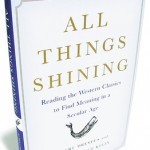The next book on my list has captured a bit of media attention lately. It’s called All Things Shining: Reading the Classics to Find Meaning in a Secular Age. It’s written by two leading philosophers: Hubert Dreyfus, an interpreter of existential philosophy who taught at UC Berkeley for more than 40 years and Sean Dorrance Kelly, professor of philosophy and chair of the Department of Philosophy at Harvard University. Here is what Barnes and Noble has to say about the book:
 “An unrelenting flow of choices confronts us at nearly every moment of our lives, and yet our culture offers us no clear way to choose. This predicament seems inevitable, but in fact it’s quite new. In medieval Europe, God’s calling was a grounding force. In ancient Greece, a whole pantheon of shining gods stood ready to draw an appropriate action out of you. Like an athlete in “the zone,†you were called to a harmonious attunement with the world, so absorbed in it that you couldn’t make a “wrong†choice. If our culture no longer takes for granted a belief in God, can we nevertheless get in touch with the Homeric moods of wonder and gratitude, and be guided by the meanings they reveal? All Things Shining says we can.
“An unrelenting flow of choices confronts us at nearly every moment of our lives, and yet our culture offers us no clear way to choose. This predicament seems inevitable, but in fact it’s quite new. In medieval Europe, God’s calling was a grounding force. In ancient Greece, a whole pantheon of shining gods stood ready to draw an appropriate action out of you. Like an athlete in “the zone,†you were called to a harmonious attunement with the world, so absorbed in it that you couldn’t make a “wrong†choice. If our culture no longer takes for granted a belief in God, can we nevertheless get in touch with the Homeric moods of wonder and gratitude, and be guided by the meanings they reveal? All Things Shining says we can.
“Hubert Dreyfus and Sean Dorrance Kelly illuminate some of the greatest works of the West to reveal how we have lost our passionate engagement with and responsiveness to the world. Their journey takes us from the wonder and openness of Homer’s polytheism to the monotheism of Dante; from the autonomy of Kant to the multiple worlds of Melville; and, finally, to the spiritual difficulties evoked by modern authors such as David Foster Wallace and Elizabeth Gilbert.Dreyfus, a philosopher at the University of California, Berkeley, for forty years, is an original thinker who finds in the classic texts of our culture a new relevance for people’s everyday lives. His lively, thought-provoking lectures have earned him a podcast audience that often reaches the iTunesU Top 40. Kelly, chair of the philosophy department at Harvard University, is an eloquent new voice whose sensitivity to the sadness of the culture—and to what remains of the wonder and gratitude that could chase it away—captures a generation adrift.Re-envisioning modern spiritual life through their examination of literature, philosophy, and religious testimony, Dreyfus and Kelly unearth ancient sources of meaning, and teach us how to rediscover the sacred, shining things that surround us every day. This book will change the way we understand our culture, our history, our sacred practices, and ourselves. It offers a new—and very old—way to celebrate and be grateful for our existence in the modern world.”
I first heard of the book after reading David Brooks’ column. In his praise of the book, Brooks writes that the authors have captured the way we live today. “For the past hundred years or so, we have lived in a secular age. That does not mean that people aren’t religious. It means there is no shared set of values we all absorb as preconscious assumptions. In our world, individuals have to find or create their own meaning. This, Dreyfus and Kelly argue, has led to a pervasive sadness. Individuals are usually not capable of creating their own lives from the ground up. So modern life is marked by frequent feelings of indecision and anxiety. People often lack the foundations upon which to make the most important choices.” This interesting hypothesis led me to purchase the book. However, in this week’s New York Review of Books another author whom I respect very much, Garry Wills, does not see anything at all to like. It was one of the strongest take-downs I’ve read in a book review for quite some time.
“This book, which was featured on the front page of The New York Times Book Review, comes recommended by some famous Big Thinkers. It is written by well-regarded professors (one of them the chairman of the Harvard philosophy department). This made me rub my eyes with astonishment as I read the book itself, so inept and shallow is it.” Now I am really curious.
Addendum: This week (March 29), David Mikics reviewed All Things Shining at The Book. It has some very good things to say, but in the end it is decidedly mixed: “Dreyfus and Kelly like the security of athletic contests and coffee drinking (which takes up another section of this shallow book), events that they want us to cherish precisely because they will never mean very much. They recommend a strange life of whooshes and lattes. Yet a deeper philosophy of life would want more meaning, not less. We cannot always have the shining, but the darkness may have something more interesting to say.”





